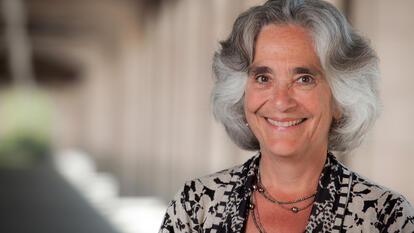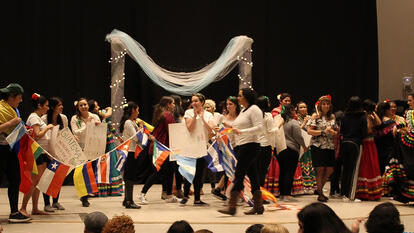Laura Sparks ’97 Named First Female President of Cooper Union

Laura Sparks ’97 was recently named president of The Cooper Union for the Advancement of Science and Art, the first woman to hold the job. The private college of art, architecture, and engineering in New York’s East Village was founded in 1859 by inventor, industrialist, and philanthropist Peter Cooper and is dedicated to helping students develop technical skills, creativity, and a sense of social justice.
That mission resonates with Sparks, she said, because of her experience at Wellesley, where she majored in philosophy and became passionate about advocating for social justice and equal education.
“I always wanted a career where I could help others,” said Sparks, whose father was a family physician and whose mother was a nurse. “Originally, I was planning to follow in my family’s footsteps and study medicine.”
That changed during her second semester at the College, when she took Introduction to Moral Philosophy and Introduction to Macroeconomics. “The connections between these two disciplines made me consider the connections in society between capital and investment, their ramifications for underserved communities, and how our economic systems and social policy choices may increase or limit opportunity,” she said. “I realized that I could potentially help people through work focused on social and economic justice.”
As she tried to figure out how, Sparks thought a great deal about social and economic justice and their intersection. “More specifically, I wondered how to reconcile the notion that our country is built as a place of equal opportunity, yet a free market is premised on having ‘winners’ and ‘losers,’” she said.
During her sophomore year she interned at Boston-based Franklin Research and Development (now Trillium Asset Management), the oldest U.S. investment advisor that focuses exclusively on sustainable and responsible investing, and spent a summer working at a community bank on Chicago’s South Side. After graduation, she worked at Goldman Sachs, which helped her develop financial skills “like no other place could,” she said, adding that the experience also confirmed that “I really need to do mission-driven work that engages my personal passions.”
Sparks found that chance with Opportunity Finance Network (OFN), a national nonprofit organization that collaborates with nonprofit community development financial institutions (CDFIs) across the country to support affordable housing and small-business development. Her time there inspired her to develop her financial and management skills further, particularly as they related to policy and regulatory issues, so she moved on to the University of Pennsylvania, enrolling in a dual J.D. and M.B.A. program at Penn Law and the Wharton School.
Sparks returned to OFN and, as senior vice president, helped create responsible financial solutions for individuals vulnerable to predatory lenders and oversaw a $45 million loan portfolio to increase investment in underserved urban and rural markets. She went on to serve as the director of development finance initiatives for Citi Community Development and Citi Foundation, where her teams worked to protect at-risk communities and homeowners during the financial crisis. Later, she became executive director of the William Penn Foundation, a $2 billion private foundation dedicated to advancing critical changes in education, the environment, the arts, and public space in the Philadelphia area.
Wellesley’s motto, Non Ministrari sed Ministrare, has guided her along the way, she said. “The trajectory of my career has been about marshalling critical resources and smart thinking to advance the public interest. Now, in my new role as president of The Cooper Union for the Advancement of Science and Art, I have the chance to again collaborate across many constituencies to find solutions to complex social challenges—like financial accessibility and sustainability in higher education—and create opportunities that can change the course of people’s lives for the better,” she said.
Her liberal arts background constantly informs her work, she said, because it gave her a foundation for thought, inquiry, and research. “The liberal arts model allows students to view the world through a variety of perspectives and to look at the world as it was, as it is, and as it might be,” she said. “It allows students to evolve as they learn, pursue new paths, and experiment with different ways of thinking.”
The personal relationships Sparks developed at the College also continue to be central to her world view. “I am still in touch with professors who helped shape my path all those years ago,” she said. “Similarly, the friendships I made at Wellesley are some of the most important relationships in my life, and the sisterhood extends far beyond my time there. I am continually amazed by the accomplishments of Wellesley women and the time we take to support one another.”



